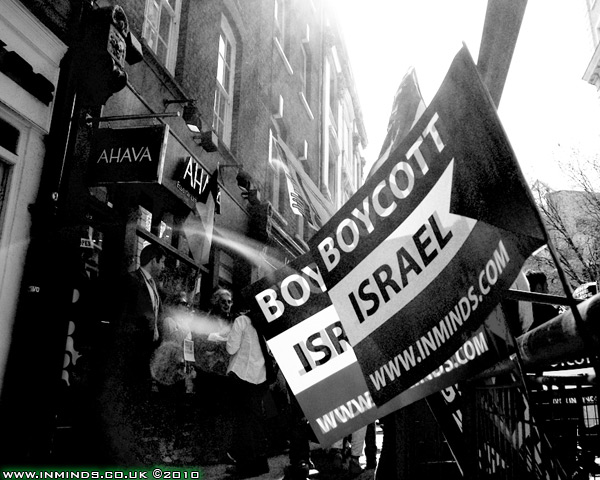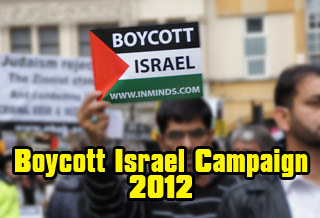
 Innovative Minds © 2014. All Rights Reserved. www.inminds.co.uk | ||||
|
Comment: Interesting Israeli insider article on the dangers of the consumer boycott to Israeli companies and the strategies they must use to fight the boycott. Its author is the CEO of a leading Israeli economic consultancy that advises Israels top 500 companies that, combined, represent more than 45% of Israels GDP.
Israeli Companies Liable to Awaken Huge Political Boycott throughout WorldAdam Reuter, The Marker (trans. from Hebrew by alternativenews.org) This article originally appeared in the Israeli economic newspaper The Marker. It was translated to English by the Alternative Information Center (AIC) in support of the Palestinian-led campaign for BDS.
The Arab boycott cost Israel $75 billion dollars
Since its establishment, Israel has been under attack regarding the legitimacy of its very existence. This attack has tremendous economic implications. In the past they were due primarily to Arab countries that created the infamous Arab boycott, which cost Israel, according to various estimates and during its first 50 years (and even prior to establishment of the state), a loss of product of between US$ 50-75 billion. The negative impact of the boycott was expressed by more than the inability of Israel to export to Arab and Muslim countries, but included also the fear of multinational companies from trading with Israel, investing in Israel and developing in Israel centres and representatives (this phenomenon was particularly prominent amongst Japanese companies, McDonaldâs did not agree to open branches in Israel and others). This direct and indirect boycott was further expressed in difficulties of Israeli companies to develop international contacts, to make trading partners, import more cheaply, export to certain markets and attain real investments in the Israeli market, amongst others. In the wake of Israelâs moves toward peace already in the days of Menachem Begin and Anwar Sadat, via the peace agreement with Jordan, the long negotiations with the Palestinians and the opening of Israeli embassies, consulates and representative offices in several Arab states, large parts of the Arab boycott were weakened and even grounded, primarily in the past 15 years. International companies, apart from a very few exceptions, no longer desist from trading and investing in Israel. As a result, today in Israel we do not fear and do not devote sufficient attention and awareness as Israelis to this strategic problem.  Boycott Israel action outside Israeli cosmetics company Ahava (London, April 2010) In order to emphasis the extent of the problem, it is sufficient to note that even more severe phenomena of economic boycott were experienced in the past by South Africans as a result of the Apartheid policies. In our time this international economic boycott transformed South Africa into a leper state and severely harmed its economy. A more severe boycott, which critically harms its economy, is experienced today by North Korea due to its nuclear policy, and we all hope that this is what will eventually happen to the Iranians. International consumersâ boycott as a strategic danger hovering over Israeli companies Clear examples, which are not widely discussed, are the consumersâ boycott existing today against Israeli security companies. There exist Muslim countries very far from us and not in the heart of the conflict, countries such as Indonesia and Malaysia, to which Israeli security companies would be happy to sell if only they could. If the problem ended with Muslim countries, so be it. However, the phenomenon is substantially wider and exists amongst countries belonging to the ânon-aligned bloc,â many of which do not purchase weapons from Israel. Harsher examples can be found amongst countries which maintain full relations with Israel, import its products but regardless, often tend not to buy Israeli security products. This problem is of course known to the security industry and the strategic danger hovering over them is much larger than that threatening security companies in other countries, which benefit from larger target audiences for their products. As noted, the Arab boycott partially dissipated, primarily in the last 15 years, and dulled our senses regarding this danger. However, in the future we are likely, as a state and primarily as Israeli companies, to encounter the danger of an international consumersâ boycott, not only due to our conflict with the Palestinians but also due to our nuclear capabilities, for which there are already signs from those calling on us to get rid of them (recently the Turkish Prime Minister Recep Tayyip Erdogan). Granted, the world is most cynical in everything concerning financial profit and a majority of companies in the world tend to ignore moral issues, from employing children, human rights violations and international conflicts. This phenomenon of ignoring violations due to cold financial considerations should reduce our fear as Israelis that a renewed and radical escalation with the Palestinians or a demand for supervision of our nuclear facilities or even a renunciation of our nuclear capability will drag us to most unpleasant places. The British High Commissioner for Palestine, Sir Harold McMichael, who hated Jews, coined already in the 1930s the concept of âfighting the Jews through their pockets.â Already today it is possible to feel in these or other international bodies which raise this idea. We are witness to calls for consumersâ boycott of Israel not necessarily from Arab states, but amongst public opinion makers in certain circles (leftists and neo-liberals, radical right wing and neo-Nazi groups), on certain university campuses and in western European states (primarily Britain, Norway and Sweden) and even in the United States, primarily in California. It should be noted that the international consumersâ boycott has heavy implications not only for Israeli exports, but can negatively impact Israeli import. The future lies with niche companies and behind the scenes production. Israeli companies must not ignore this danger. In our opinion, Israeli companies must focus on niche activities, create services and products that accompany primary products and services and must be behind the scenes and not on the main stage. This conclusion has implications for the unsuccessful idea, in our opinion, which is bandied about occasionally for the establishment of an âIsraeli Nokiaâ and so on. In our opinion, there exist three strategic solutions for taking care of this danger. It should be noted that numerous Israeli companies have already implemented one or more of these solutions, for reasons generally unrelated to fear from the aforementioned danger. 1. Israeli companies must aspire to exist and act within niche areas and be original equipment manufacturers (OEM) 2. Israeli companies in certain fields must be under the umbrella of strong multinational companies. 3. Israeli companies do not need to highlight their Israeliness but the opposite, to downplay it. Israeli companies must aspire to exist and act within niche areas and be original equipment manufacturers (OEM): Looking long-term and apart from lessening exposure to the aforementioned geopolitical danger, niche areas have numerous advantages in global competition, the most important of which may be not being in the firing line of the huge, heavy handed international companies. In niche products and services, the level of competition is generally lower, there exist more possibilities to propose a variety of products and services of limited extent. Although market potential is small and there exists a need for specialization, the primary advantage is that in certain cases it is possible to even attain global leadership (there are no few Israeli companies that indeed accomplished this in certain niches). Original equipment manufacturer (OEM) means that the Israeli manufacturer produces parts that are sold abroad under the name of a distributor or retailed under the purchasing companyâs brand name, and the Israeli product that is fully integrated cannot be identified with the Israeli manufacturer. Israeli companies in certain fields must be under the umbrella of strong multinational companies from the perspective that cooperation with international companies is good, when the Israeli company is under the wing of a strong multinational company. In this way, a consumersâ boycott will encounter difficulties as the products of the Israeli company are an integral part of the products/services that the international company sells and there will be great difficulty in implementing the boycott. It is clear that this solution is appropriate for companies in specific fields and that each case must be examined individually. It should be noted that from a market perspective, this possibility of foreign control of Israeli companies has undesirable implications for the Israeli market as foreign management, regardless of how sympathetic, will have lesser sentiments for workers in Israel than Israeli management. Additionally, the location of the companyâs management abroad lessens the demand for Israeli services connected to accounting, banking and financial and legal services, amongst others. However, in the search for a reduction in future strategic dangers for Israeli companies, the ruling trend in Israeli hi-tech, in which foreign companies acquire technologies from numerous Israeli companies, is not necessarily bad. Israeli companies should not highlight their Israeliness but downplay it. Granted, there exist certain Israeli fields that are known throughout the world and emphasizing the producer as Israeli can only enhance the ability to sell the product/service. This, of course, refers primarily to the Israeli security industries, part of the high-tech industry and Israeli water and agricultural products. With this, it is fitting to consider even in these fields a downplaying of us being the manufacturers/service supplies, if this is possible. In summary, the geopolitical and strategic danger of a consumersâ boycott on Israel may worsen in the coming years, and as such it requires at the very least some forethought by every organization involved in export or import.
Orig src: http://www.themarker.com/tmc/article.jhtml?ElementId=skira20100504_99983
Source: http://www.alternativenews.org/index.php?option=com_content&view=article&id=2588:huge-israeli-companies-liable-to-awaken-political-boycott-throughout-world-&catid=119:english&Itemid=878 Also Of InterestPage URL: http://inminds.com/article.php?id=10384
|
|
Support Us
If you agree with our work then please support us.Campaigns INMINDS Facebook Live Feed Latest Video's
INMINDS Twitter Feed Tweets by @InmindsComFeatured Video's
You need Flash player 8+ and JavaScript enabled to view this video.
[all videos (over 200)..] Featured MP3 Podcast  "Mariam Hafezji, an elderly Muslim woman living on her own in London, was terrorized in her home by a group of Orthodox Jewish teenagers from the neighbouring Jewish school for over two years. She received death threats and they destroyed her garden fence which separated her kitchen from the school. They called her a Paki and a Palestinian and indicated they would slit her throat. She was a virtual prisoner in her own home. The school refused to take any action and for two years the police ignored her pleas for help.." Victim of islamophobia Islamic Human Rights Commission 10th Anniv. Nov 2007 [3min / 2Mb] [all podcasts..] Newsletter Feedback |
 |
 |












































